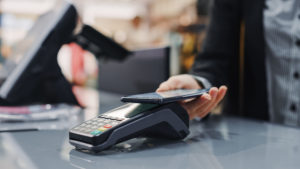
Pay dirt: The battle for your digital dollars
Last updated on May 29th, 2025
The digital world has transformed the way we live, work and play. Transactions that used to take place in cash or with paper cheques are now completed online, using digital payment platforms.
In Australia, there are a number of different digital payment platforms available, each vying for a share of the market. In 2021, the industry processed about 55 million payments. That is worth about $650 billion each day, according to The Australian Financial Review. But behind this progress are growing concerns not only from banking institutions but governments.
Why are banks worried about digital wallets?
There are a number of reasons why banks are concerned about the rise in popularity of digital wallets, such as Apple Pay and Google Pay. They claim the playing field isn’t even, for starters, but of course, their biggest concern relates to the bottom line. They may still hold the lion’s share of the online payment platform, but digital wallets are tipped to overtake credit cards in terms of digital payments by 2025.
Lost revenue
Digital wallets provide a direct challenge to the traditional banking model. Banks make money from fees — such as interest, late payment, annual fees, withdrawal fees and account keeping fees — and charges associated with transactions.
When a customer uses a credit or debit card, for example, to make a purchase, the bank charges the merchant a fee for processing the transaction. This is known as the interchange fee.
Digital wallets bypass the need for a physical credit or debit card, meaning that banks miss out on this revenue. On top of that, Apple charges banks for every $100 transaction when their card is used for an Apple Pay transaction.
In addition, Google Pay and Apple Pay use Near-field Communication (NFC) instead of the traditional method. The traditional method enables banks to make money through swipe fees. NFC prevents banks from earning interest on money that is being transferred. Simply put, digital wallets bypass these fees, which can eat into banking profits.
Besides just making payments, you can also use online payment platforms for other activities. You can store loyalty cards and other important information such as vaccination certificates. PayPal also allows you to send and receive money. And Visa has its own digital wallet called VISA Checkout. This allows you to store your credit and debit cards as well as your shipping information. Commonwealth Bank is set to allow its app users to invest in cryptocurrency.
Decreasing market share
Another reason for banks' concern is market share. In Australia, the big four banks — ANZ, CBA, NAB and Westpac — have more than 80 percent of the market.
Despite their dominance, they are vulnerable to any new entrant that can provide a better or more innovative product. And digital wallets have already exposed these vulnerabilities.

They are typically much easier to use than traditional banking products. Also, they offer a range of features and benefits that appeal to customers. They enable customers to shop with nothing but their phones and can be used to make contactless payments. It provides a fast and convenient way to pay for everyday items.
In addition, digital wallets can be linked to loyalty programs and rewards points. This provides an additional incentive for customers to switch.
What about Buy Now, Pay Later?
Banks have also been threatened by the rise of Buy Now, Pay Later (BNPL) services such as Afterpay and Zip. These services make up a growing share of the digital payments market.
While they are not technically digital wallets, they provide a similar service and compete for the same customers. Like digital wallets, BNPL services allow customers to make purchases without using a credit or debit card.
However, instead of being linked to a payment app, these services are usually linked to the customer's bank account. This means that banks have to process the transactions, which costs them money. In addition, BNPL services may charge customers a transaction fee for each purchase, effectively funneling more money away from the banks.
Banks don't have the hardware to keep up with the trend, which is moving away from cards and towards phones. Apple, for example, was accused of “(restricting) payment cards from making ‘tap and go’ payments unless they are stored in Apple’s digital wallet. Cards held in a third-party iPhone wallet, such as a bank app, can pay in a store only if they are routed through Apple Pay”. If Apple had the power to restrict cards altogether, this could make all bank cards obsolete.
Lost consumer data
Digital wallets remove the visibility of transaction details for banks. Data is a key commodity in the digital world. The more data, the more valuable to the company who holds it. Digital wallets have a wealth of data about consumers. This data can be used to target them with ads and other marketing materials. Banks are missing out on this, too.
Less regulation
The banking royal commission put banks and other financial institutions in the hot seat. Although a recent report found that only a third of the recommendations tabled in 2019 has so far been implemented.
But Australian Banking Association (ABA) CEO Anna Bligh maintains the government needs to turn its attention to regulation to ensure that banks are not unfairly disadvantaged by the new players on the market.
“Big changes are happening now, led by customers moving to use digital wallets and leaving cash, and even their debit cards, behind,” she told the Australian Financial Review (AFR).
Digital wallets are not subject to the same rules and regulations as banks. So they can offer products and services that their competitors can not.
This lack of oversight raises the risk that digital wallets could be used for illegal transactions. And the regulator would have no control over them.
The ABA also wants the government to change the comprehensive credit reporting regime to cover BNPL, to “ensure that consumers have the right protections".
More company tax (than others)
Another key concern for banks is the fact that they have to pay more taxes.
“Australia’s five largest banks between them pay more company tax than the rest of the ASX 200 combined and if a significant amount of their revenue ends up in the pockets of companies like Apple, that is revenue that is not going to come back to the Australian taxpayer,” Ms Bligh told the AFR.
This is because banks are considered to be financial institutions. While most digital wallets are owned and operated by foreign companies.
This puts them at a disadvantage to digital wallet providers, such as Apple Pay, which is only subject to corporate tax while banks are subject to corporate tax plus policyholder tax, fringe benefits tax, land tax and others. Revenue from multinationals goes offshore because they don’t pay that much tax. This affects the profitability of banks (more tax = less profit). It also makes banks feel disadvantaged in the territory they are servicing.
Why are Google Pay, Apple Pay and Samsung Wallet free to use?
Other revenue streams
These digital wallets are owned and created by huge multinationals that have revenue streams elsewhere through the selling of hardware, software or other services. So they don’t need to make money from charging for transactions. In fact, they are able to upsell on the basis of the fact they offer services like digital wallets for free.
They want your data now
Digital wallets are not just a payment platform. They are also a way for companies to collect data about consumers. This data is used to target them with ads and other marketing materials.

Google Pay, for example, is linked to Gmail and Google Maps. Apple Pay is linked to the iPhone and iTunes store. Samsung Wallet is linked to the Samsung Galaxy smartphone. This means that these companies have a wealth of data about users that they can use to target them with ads.
They also want customer traction on their products now and into the future. Using your data, they can improve their products and services and make them more valuable to consumers. They also offer extras inside the payment platform, such as tracking vaccination certificates, storing gift cards, event tickets, airline boarding passes or loyalty programs. Then they can use these features to capture even more data about you, which they will then use to offer more extras in the future. The cycle goes on.
Why is data so valuable to e-commerce players?
Data is the new oil. It’s an extremely valuable commodity.
Data is used to understand consumers, target them with ads and sell them products and services. It is also used to improve products and services. Companies can also sell your data to third parties for a premium.
It used to be so much harder to understand what consumers wanted. In the book Scientific Advertising, Claude Hopkins wrote: “Advertising was a gamble, a speculation of the rashest sort. One man's guess on the proper course was as likely to be as good as another’s. There were no safe pilots because few sailed the same course twice.”
Digital data has changed all of that. Now you can monitor the type of content people want, when they consume it, and where. The more data you have, the better you can plan for the future.
The regulation headaches
As mentioned above, the lack of regulation around digital wallets and other online payment competitors is a major problem for banks. They are struggling to keep up with the pace of change and are at a disadvantage compared to other players in the market.
This is because digital wallets fall into a regulatory grey area. The rules around them are not clear, enabling providers to operate without any restrictions.
This is in part, the AFR argues, due to “antiquated legal definitions of fundamental concepts such as what is a financial product or a payment system”. This is why Apple could maintain Apple Pay was not a payment service “but that its app provides the ‘technical’ architecture that allows customers to make payments with their bank cards”. This definition means regulators can not get full access to payment transactions going through the system.
Digital wallets also fall into a regulatory grey area when it comes to data protection because they’re owned and operated by foreign companies. They are not subject to the same rules as banks and other local financial institutions, which means that they can collect and store data without any restrictions.
BNPL is also exempt from the Credit Act or the National Credit Code. BNPL maintains it is not a lending product; hence, it should not be bound by the Act. While banks are required to do extensive checks on borrowing customers, BNPL providers like Afterpay are not required to do so, allowing the latter to target anyone – including those struggling financially.
What are some of the issues with digital payment platforms?
One of the biggest issue is the way that these platforms handle customer data. Some platforms have been known to sell customer data without their knowledge or consent. This has led to personal information being exposed.
Another controversy is around the fees that these platforms charge. Some digital payment platform users believe that the fees are too high and that they are not worth the benefits that these platforms offer.
Then there are company-specific complaints, such as these:
Apple Pay
The competition regulator launched a formal probe into Apple's method of controlling bank access to the antennas on its iPhones that connect to payment terminals, in response to concerns raised by Commonwealth Bank. The Australian Competition and Consumer Commission (ACCC) is concerned about the design of iPhones, which prevents payment cards from making "tap and go" payments unless they are kept in Apple Pay's digital wallet. If a card is kept in a third-party iPhone wallet like a bank app, it can only be used to pay for goods via Apple Pay.
PayPal
PayPal has been accused of being a monopoly and engaging in anti-competitive practices. The company has also been criticised for its handling of disputes. PayPal's terms and conditions seem to penalise both buyers and sellers in different ways. For example, if a buyer disputes a transaction, PayPal can charge the seller a fee to investigate the transaction and may also put a black mark against the seller's account. They can even close your account without warning, and you can lose money.
Visa and Mastercard
In January this year, Amazon UK planned to stop accepting Visa on its e-marketplace due to "continued high costs of payments". While it doesn't apply to Australia now, it could become applicable if Visa continues raising its merchant costs.
Surcharge costs
Mastercard and Visa are banned from charging excessive surcharges. This means they can impose a payment surcharge but are only allowed to pass on to the customer the costs that the business was charged for accepting that payment type. If, for example, you bought a bag via Mastercard, and there's a fee of one percent for the merchant, the latter can pass on the cost to you.

BPAY, PayPal, Diners Club cards, American Express, on the other hand, are not covered by the ban. So they can charge you more than what they were charged for a transaction. If the merchant fee is one percent, you can be charged 1.5 percent without recourse, so long as it is in accordance with the Australian Consumer Law (ACL).
Who can help when things go wrong?
The regulation loopholes and controversies combined with the fact that there’s no central platform for digital complaints are a recipe for disaster. Who’s responsible when things go wrong?
Even though we know that banks are more expensive and a pain to deal with, they offer good fraud protection and a chargeback process if you don’t get what you pay for. And at least we know what authority is responsible. With digital wallets and BNPL, consumer safeguards are not as well established and the regulatory authority is not obvious.
Nonetheless, this doesn’t mean you’re all on your own when you’re having trouble with a digital platform. We’re here to help you when you’re having an issue. Just say the magic words 'Help Me Handle It'.






